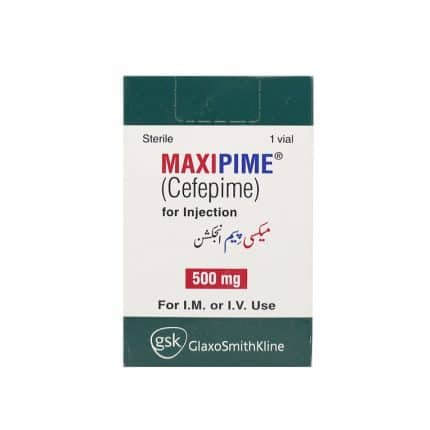Maxpime 500mg Injection contains the active ingredient cefepime, which is a fourth-generation cephalosporin antibiotic. It is formulated for intravenous administration and is used to treat a wide range of bacterial infections. Cefepime is known for its broad spectrum of activity against both Gram-positive and Gram-negative bacteria, including many multi-drug resistant strains.
Uses:
- Bacterial Infections: Maxpime Injection is indicated for the treatment of various bacterial infections, including:
- Respiratory tract infections such as pneumonia and bronchitis.
- Urinary tract infections including cystitis and pyelonephritis.
- Skin and soft tissue infections such as cellulitis and wound infections.
- Intra-abdominal infections such as peritonitis and cholecystitis.
- Septicemia and bacteremia.
- Febrile neutropenia in immunocompromised patients.
Mechanism of Action:
Cefepime exerts its antibacterial effects by inhibiting bacterial cell wall synthesis. It achieves this by binding to penicillin-binding proteins (PBPs) located on the bacterial cell membrane, thereby interfering with cell wall formation. This leads to cell wall instability and ultimately bacterial cell death.
Dosage and Administration:
- The dosage of Maxpime Injection and the duration of treatment depend on the type and severity of the infection, as well as the patient’s age, weight, and renal function.
- It is administered via intravenous infusion over a period determined by the healthcare provider, typically in a healthcare setting such as a hospital or clinic.
Side Effects:
While generally well-tolerated, Maxpime Injection may cause some side effects, including:
- Gastrointestinal disturbances such as nausea, vomiting, diarrhea, and abdominal pain.
- Allergic reactions ranging from rash and itching to severe hypersensitivity reactions such as anaphylaxis.
- Injection site reactions such as pain, swelling, or redness.
- Headache, dizziness, and fatigue.
- Changes in liver function tests.
- Pseudomembranous colitis (rare but serious).
Precautions:
- Inform your healthcare provider about any existing medical conditions, allergies, or medications you are taking before receiving Maxpime Injection.
- Use with caution in patients with a history of allergic reactions to cephalosporins or penicillins.
- Close monitoring of renal function, liver function, and complete blood count (CBC) is recommended during prolonged therapy.
- Avoid using Maxpime Injection in patients with known hypersensitivity to cefepime or any components of the injection.
When Not to Use:
Maxpime Injection should be avoided in patients with:
- Known hypersensitivity to cefepime or any components of the injection.
- History of severe allergic reactions to cephalosporins or penicillins.
- Neonates with hyperbilirubinemia, particularly those receiving phototherapy, as cefepime may displace bilirubin from albumin and lead to kernicterus.
FAQs (Frequently Asked Questions):
- How often should Maxpime Injection be administered?
- The frequency of administration and duration of treatment with Maxpime Injection depend on the type and severity of the infection. Follow your healthcare provider’s instructions.
- Can Maxpime Injection be used during pregnancy?
- Maxpime Injection should only be used during pregnancy if the potential benefits outweigh the risks. Consult your doctor for personalized advice.
- Is it safe to consume alcohol while receiving Maxpime Injection?
- It is generally advisable to avoid alcohol while undergoing antibiotic treatment as it may interfere with the effectiveness of the medication and increase the risk of side effects.
- What should I do if I miss a dose of Maxpime Injection?
- If you miss a dose, contact your healthcare provider for instructions. Do not double the dose to make up for a missed one.
- Can Maxpime Injection be used in pediatric patients?
- Maxpime Injection may be used in pediatric patients under the guidance of a healthcare provider, adjusting the dosage based on the child’s weight and condition.






Reviews
There are no reviews yet.